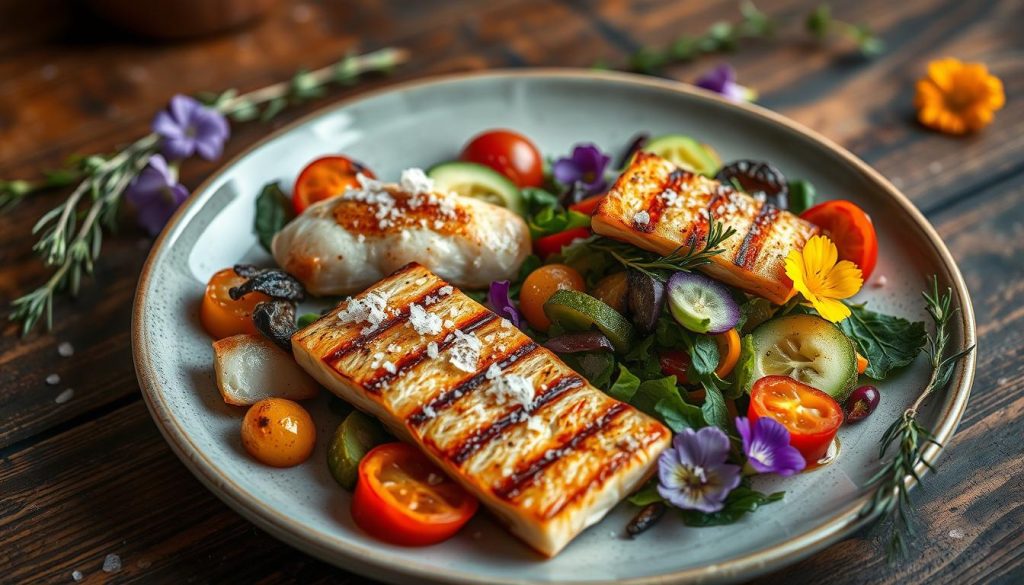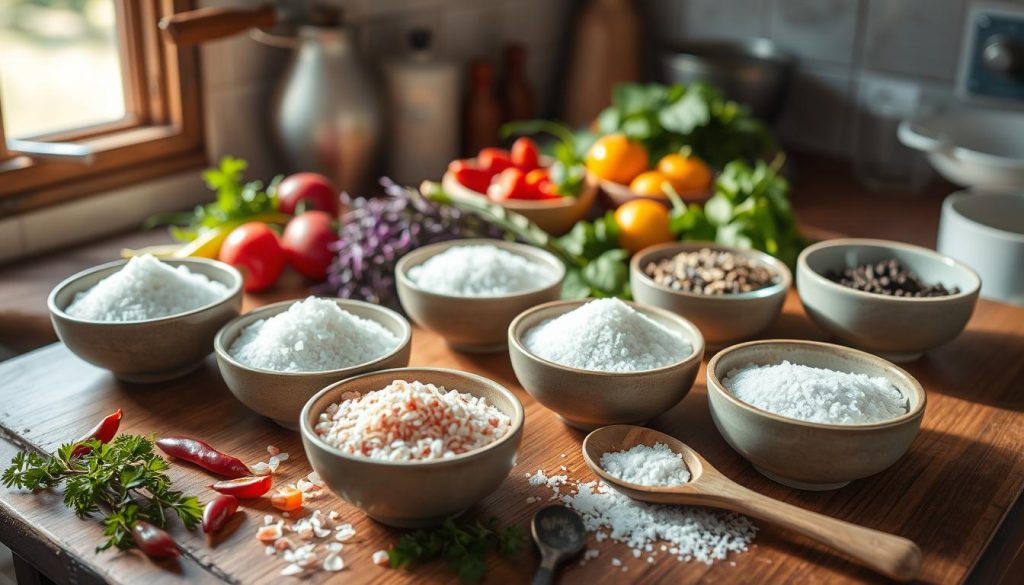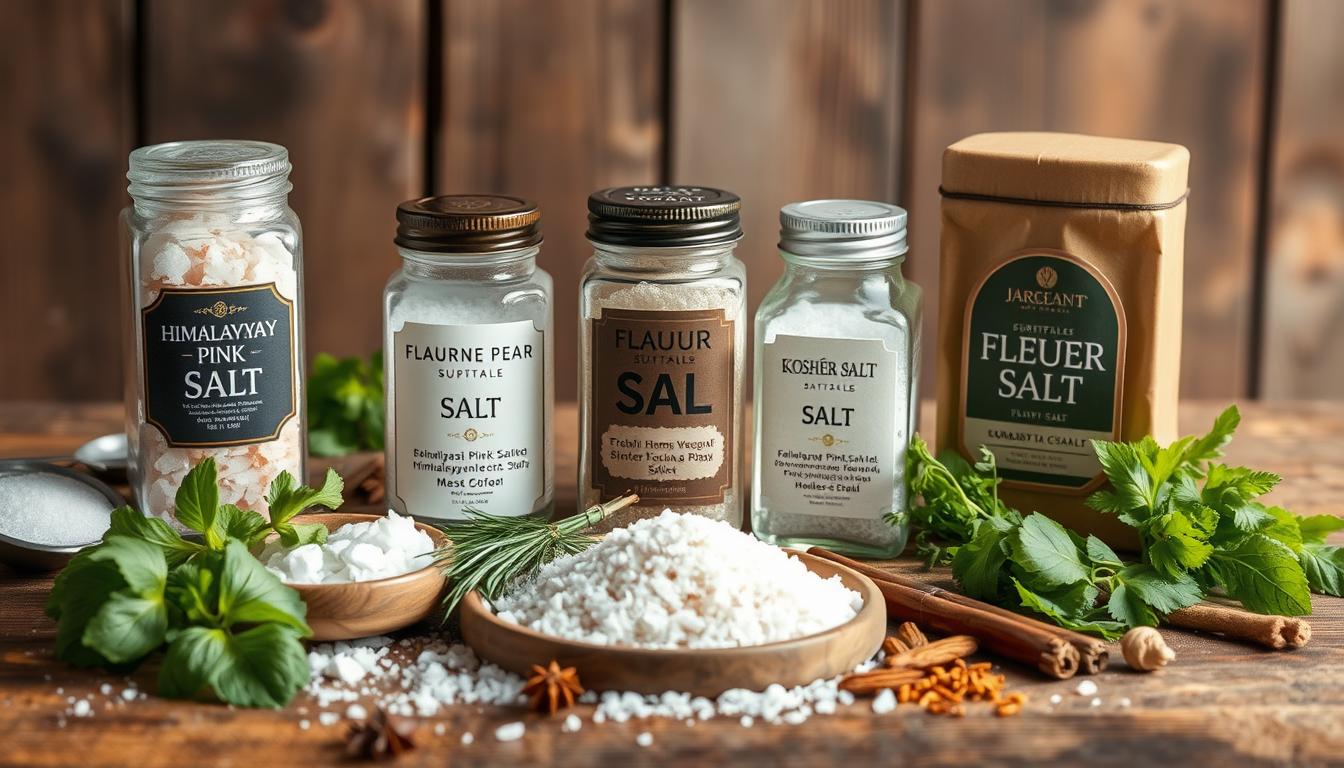Fleur de sel is a gourmet salt known for its delicate texture and unique flavor. It’s often used as a finishing touch in various dishes. But, what if you’re out of this exquisite salt? Don’t worry! This guide will show you the best alternatives for fleur de sel to enhance your cooking.
Exploring substitutes like kosher salt, sel gris, and others will introduce you to new flavors and textures. These options can keep your dishes tasting great. This guide will help you find alternatives that taste similar, are more affordable, and easy to find.
What is Fleur de Sel?
Fleur de sel, meaning “flower of salt,” is known for its soft texture and special taste. It comes mainly from France’s coast, like Brittany. It’s different from regular salt because of how it’s made, giving it a unique salty flavor that chefs and food lovers enjoy.
Definition and Origins
The history of fleur de sel is rich and shows its importance in French cooking. It’s collected from shallow seawater pools, needing perfect weather. This makes it rare and valuable, with a flavor that’s sought after.
Its fleur de sel origin makes it special. It’s harvested by hand, which adds to its quality. The salt’s minerals give it a deep taste.
Harvesting Process
The harvesting fleur de sel process is detailed and shows the skill behind this salt. It’s picked at certain times, like early morning or late afternoon. This careful timing helps keep the crystals intact.
The process is hard work, but it pays off. Only the best crystals are chosen. This makes fleur de sel production a favorite in fancy kitchens around the world.
| Type of Salt | Origin | Flavor Profile | Harvesting Method |
|---|---|---|---|
| Fleur de Sel | Brittany, France | Delicate, briny | Hand-harvested |
| Celtic Sea Salt | Atlantic Ocean, France | Robust, gray | Traditional methods |
| Himalayan Pink Salt | Himalayas | Mild, mineral-rich | Mining |
| Black Lava Salt | Hawaii, Cyprus | Rich, earthy | Harvested |
Why Use a Fleur de Sel Substitute?
Fleur de sel is key in making dishes taste better. It’s often used as a final touch to enhance flavors in many foods. Its crunchy texture adds a special touch to meals.
Its availability and price can be a problem. This salt is rare and hard to find in regular stores. If you can’t find it, substitutes like kosher salt can work just as well.
Understanding Culinary Uses
Fleur de sel does more than just taste good. It also adds a nice crunch to dishes. Each type of fleur de sel has its own unique flavor, thanks to where it’s made.
For example, fleur de sel from Guérande has a strong ocean flavor. While it’s a luxury, you can find cheaper alternatives that still taste great.
Cost and Availability
Fleur de sel is very expensive, sometimes costing 200 times more than regular salt. In France, a small bag costs less than $9. But in the US, it can cost around $24 online.
Finding fleur de sel is also hard, as it’s not common in stores. But, you can find cheaper options like French grey salt or sel gris for under $2.

| Salt Type | Cost per 250g | Texture | Flavor Profile |
|---|---|---|---|
| Fleur de Sel | $13 – $24 | Crunchy | Mineral-rich, ocean-like |
| Maldon Salt | $6 – $10 | Flaky | Clean and crisp |
| Sel Gris | $1.70 | Coarse | Earthy, complex |
| Sea Salt | $3 – $8 | Varies | Salty, with trace minerals |
Fleur de Sel Substitute Guide
Looking for the best fleur de sel substitutes can take your cooking to the next level. It lets you explore different flavors and salty profiles. Here are some top picks that can replace fleur de sel, along with a flavor comparison to help you choose the right one for your dish.
Top Alternatives
- Kosher Salt: This salt is loved for its coarse texture and clean taste. It’s a great match for fleur de sel and can be used in the same amount.
- Sel Gris: With its gray color and strong flavor, sel gris offers a deeper briny taste. It’s a bold choice.
- Maldon Sea Salt: Known for its unique pyramid crystals, this sea salt has a milder taste and a nice crunch.
- Hawaiian Pink Salt: This ancient salt has a subtle sweetness and minerals, making it a tasty option.
- Halen Mon Sea Salt: A British sea salt with complex flavors, it adds depth to dishes and serves as a great fleur de sel substitute.
Comparison of Substitute Flavors
Knowing how different fleur de sel substitutes taste can make your cooking better. The table below compares various salts, focusing on their flavors and textures.
| Substitute | Salty Flavor Profile | Texture | Best Uses |
|---|---|---|---|
| Kosher Salt | Clean, moderate saltiness | Coarse, flaky | Seasoning meats, vegetables |
| Sel Gris | Briny, complex | Moist, granulated | Salads, finishing dishes |
| Maldon Sea Salt | Mild, delicate | Crunchy, flaky | Garnishing chocolates, seafood |
| Hawaiian Pink Salt | Slightly sweet, mineral | Granular, flaky | Grilling, roasting |
| Halen Mon Sea Salt | Rich, balanced | Granular | Pasta dishes, soups |
How to Use Fleur de Sel Substitutes in Cooking
Using substitutes for fleur de sel can make your dishes taste better. Learning how to use these alternatives will make your cooking stand out. You’ll get great flavors without losing taste.
Meat and Seafood Dishes
For meat and seafood, add the substitutes just before serving. Kosher salt or sel gris add a burst of flavor. They’re perfect for grilled meats and seafood, bringing out their natural taste.
These substitutes keep the texture of seafood just right. A little sprinkle can make a big difference in taste.
Vegetables and Salads
Use these substitutes as a finishing touch for vegetables. They boost the natural flavors without drying out the veggies. In salads, they add depth without overpowering the fresh ingredients.
A light sprinkle can make simple salads and roasted veggies taste amazing. It adds a sophisticated touch to every bite.
Baking and Desserts
In baking and desserts, salt is key for balancing sweetness. Fleur de sel substitutes work well in caramel or chocolate desserts. They create a nice contrast to sweetness.
They also enhance flavors in baked goods. This adds a hint of savory to sweet dishes, creating a perfect balance.

Conclusion
Learning about fleur de sel makes you appreciate its substitutes more. This summary shows how flavor and texture matter in cooking. Using coarse sea salt or kosher salt can mimic fleur de sel’s unique taste.
These alternatives are great for keeping your dishes elegant, even when you can’t find fleur de sel. They make sure your meals stay full of flavor and life.
When picking substitutes, think about what each one adds to your food. Fine sea salt is perfect for sauces because it dissolves fast. Coarse sea salt is good for most recipes, used the same amount as fleur de sel.
It’s also smart to follow health guidelines on salt intake. This way, you can make meals that are tasty and healthy. Even though fleur de sel is pricey, there are many other options to try.
Choosing the right seasonings can really improve your cooking. By using these substitutes wisely and watching your salt intake, your food will taste amazing. And it will also be good for you. So, go ahead and try these alternatives in your kitchen. You’ll love the results!
Source Links
- https://saltwise.com/blogs/news/different-types-of-salts?srsltid=AfmBOorUU2j_L5buicdTUvJIutnILZW3gOEgpFihkoECcjrO0Cf-fkd8
- https://sinfulkitchen.com/10-best-kosher-salt-substitutes/
- https://www.gobble.com/blog/types-of-salt/
- https://fooddrinklife.com/mineral-rich-salt/
- https://food-hacks.wonderhowto.com/how-to/why-you-should-be-using-fleur-de-sel-instead-regular-table-salt-plus-fake-it-0155879/
- https://www.souschef.co.uk/blogs/the-bureau-of-taste/fleur-de-sel-a-hand-picked-salt?srsltid=AfmBOoqMuGYKL985KQKyGwEerwIhuXUXl0w2nhGgit9ZNhP0IkHlTgaE
- https://www.davidlebovitz.com/about-salt-sel-fleur-de-sel-kosher-sea/
- https://www.wasserstrom.com/blog/2024/08/30/specialty-salt-a-chefs-guide/?srsltid=AfmBOopQlW1QOCQnycEiLMnOau7j_IhKRAfd7VYTx03ozRnC2TVQl4C8
- https://saltwise.com/blogs/news/different-types-of-salts?srsltid=AfmBOoqM7TJC5Dbz-1kh7HcLK-GiRRd0OIe0BAwOwKlnZCgwyeaKowNl
- https://www.spiceography.com/fleur-de-sel-substitute/
- https://www.mishry.com/substitues-of-flower-of-salt
- https://www.mdpi.com/2079-9276/11/7/63
- https://www.alsothecrumbsplease.com/kosher-salt-substitutes/
